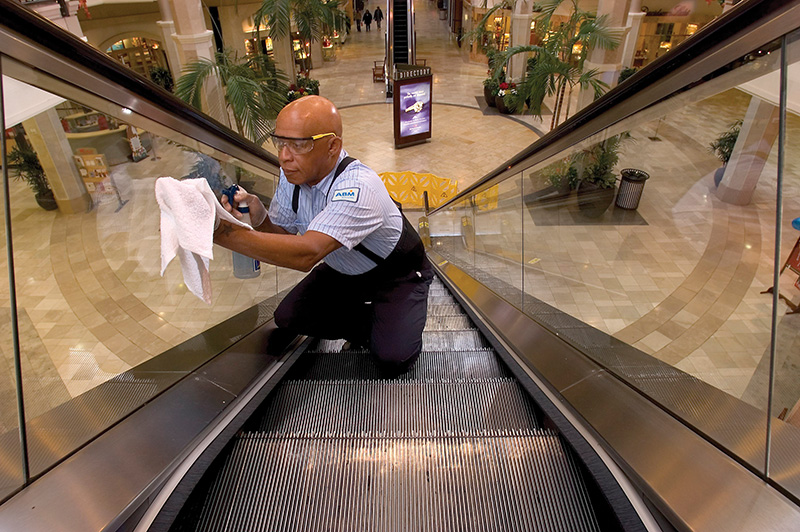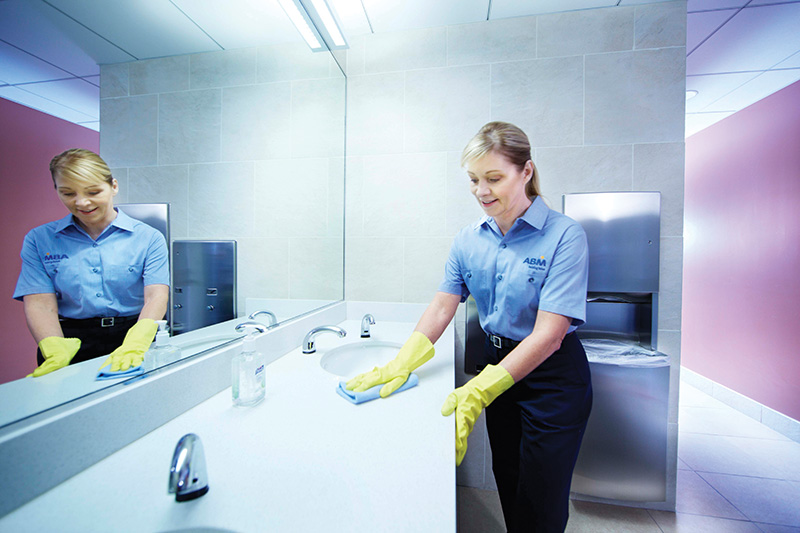The impact of high quality janitorial services on productivity, employee satisfaction and brand reputation.
By Bob Clarke
Building owners or facilities managers commonly make the mistake of viewing janitorial services as a cost instead of an investment. Executives — most notably organizations’ CFOs — frequently need to be reminded that maintaining a spotless and sanitary environment will pay for itself many times over — often in unanticipated ways.
In fact, some experts have said that the cleanliness of a working environment could possibly play a key role in keeping workers healthy and productive. By boosting peace of mind on the job and even attendance — and, in turn, productivity and customer satisfaction — the janitorial services industry can build a financial argument that will convince even the accountants.
 Don’t believe your workplace is dirty? Think again. A recent “unhygienic workplace study” in Australia has found that an average office desk contains nearly 400 times as much bacteria as a toilet seat, costing businesses in that country $5.4 billion in lost earnings. But contaminants are not isolated to surfaces. According to the U.S. Green Building Council, indoor air is a major component to a facility’s environmental quality and a major factor in employees’ health and wellbeing. In addition to changing air filters regularly and proactively, another key to maintaining clean air is to eliminate or control the contaminants with a consistent, high quality janitorial service.
Don’t believe your workplace is dirty? Think again. A recent “unhygienic workplace study” in Australia has found that an average office desk contains nearly 400 times as much bacteria as a toilet seat, costing businesses in that country $5.4 billion in lost earnings. But contaminants are not isolated to surfaces. According to the U.S. Green Building Council, indoor air is a major component to a facility’s environmental quality and a major factor in employees’ health and wellbeing. In addition to changing air filters regularly and proactively, another key to maintaining clean air is to eliminate or control the contaminants with a consistent, high quality janitorial service.
How can you be sure that the janitorial provider you’ve hired is best equipped to keep your facility free of contaminants and improve air quality, which will improve worker health? It’s imperative to seek out providers that strive to hire cleaning professionals who take pride in their work. Too many janitorial companies take shortcuts, and results can often show. Look for a janitorial provider that focuses on empowering its cleaning staff through proper training and the latest in tools and products.
Selecting cleaning products that are environmentally preferable is also a key factor to improved indoor air quality. The evolution of green cleaning has resulted in companies utilizing safer processes such as electrolyzed water. Studies have shown that building occupants, visitors and even the janitorial staff experience fewer incidents of skin, eye and respiratory irritations; allergies; multiple-chemical sensitivities; headaches; and nausea.
In addition to potentially improving employee health, which could also lead to a reduction in worker sick days, professional janitorial services also preserve and protect building assets such as carpets, floors and tile surfaces. It can prevent excessive wear and extends life spans of a facility’s assets — whether those assets listed above or any number of other infrastructure components of a building. That can affect the bottom line.
The idea that a clean, healthy building creates a welcoming atmosphere for its occupants is garnering a great deal of attention in the C-suite these days thanks to companies like e-retailer Zappos.com. CEO Tony Hsieh has made headlines by building the principles of human motivation into Zappos.com’s core values, eliminating specific job titles and postings and even offering employees $2,000 to quit anytime during the 5-week training period if they feel the company is not a good fit. Yet at the center of his philosophy is a simple idea: He believes that the secret to success is happy employees, and that a company’s brand is its culture.
Considering the fact that workplace environment is believed to be one of the most important aspects of a successful company culture by Zappos, there could be a direct correlation between investing in first-rate janitorial services and proven growth. Since it was founded in 1999, Zappos.com has become one of the largest online shoe retailers in the world and was acquired by Amazon.com for $1.2 billion in 2009.
 Also, day cleaning — a newer approach to sustainability that includes energy efficiencies based on cleaning staff not being present after regular office hours — has many benefits in terms of both employee satisfaction and productivity. Why? Because it generates fewer complaints from employees. While cleaning services have historically done their work after hours, it’s become clear that working during the day creates a bond between janitor and building occupant because the two parties build personal relationships over time, not to mention the energy savings a building might receive.
Also, day cleaning — a newer approach to sustainability that includes energy efficiencies based on cleaning staff not being present after regular office hours — has many benefits in terms of both employee satisfaction and productivity. Why? Because it generates fewer complaints from employees. While cleaning services have historically done their work after hours, it’s become clear that working during the day creates a bond between janitor and building occupant because the two parties build personal relationships over time, not to mention the energy savings a building might receive.
While research and case studies such as Zappos.com establish that clean facilities improve employee productivity, often overlooked is the fact that a sparkling workplace can also be an excellent marketing tool, whether you’re trying to impress prospective clients, lease space or sell the building.
In today’s digital world, companies invest heavily in their online presence. Because every consumer with a connection to the Internet can review, scrutinize and vet a company in minutes, brand reputation has become less a priority and more a core capability. Many organizations overlook the fact that the appearance of their facilities reflect just as strongly on their brand reputation as the quality of their website.
When a potential client walks through the door and enters your business they will immediately judge your company based on what they see. There is always the possibility that clients who walk into a dirty office will immediately question the company’s credibility, which could have a direct impact on any brand.
When we start to connect the dots between proper cleaning, employee attendance and performance, customer satisfaction and spending, then the value of commercial cleaning will be better understood and it will be harder to cut cleaning budgets — or always choose the lowest bidder. A comprehensive cleaning strategy from an experienced provider is paramount to maintaining productivity, employee satisfaction and brand reputation.
— Bob Clarke is senior vice president, sales and marketing of ABM’s new Onsite Services business model. Clarke brings more than 25 years of experience in the facilities services industry. He has overseen and managed the ABM janitorial division’s national and regional sales teams and organic growth strategy over the last several years. Email the author at [email protected].
